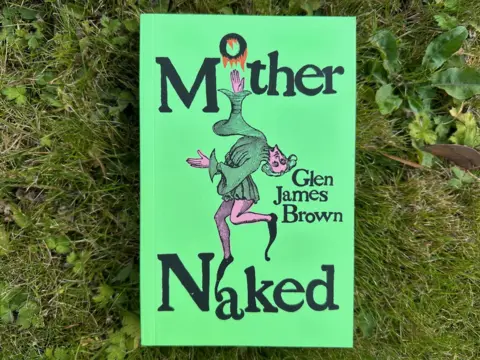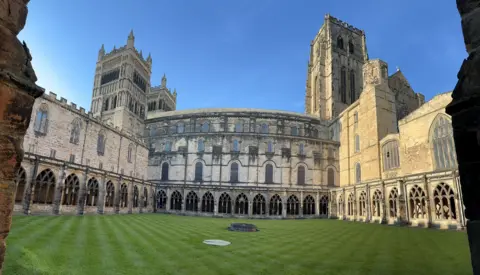How a name from cathedral's past inspired novel
 Susan K Barker
Susan K BarkerWandering minstrel Mother Naked clearly did not impress his audience, the measly one groat he received being the smallest amount ever paid to an entertainer in Durham Cathedral's centuries-old records.
But his notable name and pittance of a payment captivated author Glen James Brown.
"All the light bulbs went off in my head, I felt compelled to write his story," the 41-year-old says.
Glen, whose 2018 Teesside-based debut novel Ironopolis received rave reviews, was browsing online during the coronavirus pandemic when he came across an obscure reference to the mysterious bard.
It was on a page run by Records of Early English Drama North East, a regional offshoot of an international project collating references to entertainment performances in medieval documents.
Modyr Nakett (Mother Naked in old English) was recorded as being a male minstrel who was paid one groat, or four pence, in the cathedral's bursar accounts from 1433-34.
"It was like a tenner in today's money," Glen says. "Scholars think he may have been paid so little because his performance was obscene or disagreeable in some way."

Because of his unusual name, it is also believed Mother Naked may have been a Betty, a man playing a "proto-pantomime dame" or "matriarchal figure", Glen says.
"All we know for sure was his name and how much he got paid.
"I had carte blanche to make up the rest."
Glen's novel, Mother Naked, is written as a monologue performed by the minstrel in the cathedral in 1433.
Addressing a crowd of local clergy, the powerful elite who controlled the lands of County Durham, Mother Naked tells a supernatural tale of a village plagued by a terrible and terrifying wraith.
The village is Segerston, now modern day Sacriston, and Mother Naked is a story about class and the struggles of the peasants who toiled the fields under a system which saw many have to labour for free for their masters before they could grow anything for themselves.
"They would fight among themselves but never really blame the people who put that system in place," Glen says. "It struck me that not much has really changed.
"The parallels between then and now, the inequalities, the widening gaps between rich and poor, it was fascinating."

The lives of the characters revolve around their obedience to religion, no matter how hard that made their existence.
"We would struggle to understand that now," Glen says. "People could not fight back or agitate for change because it was explained to them that God made them a peasant, so if they were complaining they were pushing back against God.
"We still do a similar thing, only now it's not God but rather the socio-economic and political system that’s synonymous with the values of our country.
"If you are pushing back against your situation you are pushing back against the system."
Glen, who was born and raised in Chester-le-Street, County Durham, and now lives in Manchester where he works as a part-time university writing tutor, said the idea of Mother Naked came to him in a flash.
He then spent four months researching 15th Century society and the language of the time.

He wanted his 222-page monologue to sound authentic, invoking the vibes of Chaucer, but be readable for a modern audience, for which he found medieval cook books surprisingly helpful.
"They have a lot of action words, like chop, cut or boil, " Glen says.
"For example, rather than just say 'cut an onion', they might have said 'smite an onion to gobbets', which were just incredible words.
"I went through old books looking for phrases I found cool and that would make sense in the context even if people did not know the actual word."
The biggest challenge was adding exposition and explanation of unfamiliar systems to aid the modern reader without disrupting the flow of the minstrel, Glen says.

It took him six weeks to write the first draft which was "unheard of" for him, pointing out Ironoplis took him two and a half years.
"Once I got in Mother Naked's headspace, I just went for it," Glen says.
A month of that writing was done at the library of former Prime Minister William Gladstone in Hawarden, North Wales, after winning a writer in residence scholarship.
A further year was spent editing and polishing before the book was published in June, with its reception proving very popular so far.
Glen will be returning to Durham on Wednesday to give a talk at Collected Bookshop.
He will be hoping to put on a better performance than Modyr Nakett did 590 years ago.
Follow BBC North East on X, Facebook, Nextdoor and Instagram. Send your story ideas to [email protected].
